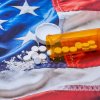- Date
- 28 July 2021
Analysis of The Week: An Opioid Epidemic
Analysis of The Week: An Opioid Epidemic
By Alison Catchpole |
According to the US Centers for Disease Control and Prevention, provisional data showed 2020 was a record year for drug overdose deaths, with over 93,000 - up 29% from a year earlier.
"Our country's opioid epidemic is a nationwide public health crisis that requires a nationwide solution," was the statement made by a coalition of private attorneys known as the Plaintiffs Executive Committee, which represents some state and local governments seeking legal recourse.
A proposed settlement for $26 billion would resolve nearly 4,000 claims in federal and state courts. These claims accuse the pharmaceutical companies of fuelling the opioid crisis through deceptive marketing and downplaying the risk of addiction. Drug manufacturer Johnson & Johnson (J&J), which is already paying $230 million to settle claims in New York, would pay $5 billion over nine years. The three largest US drug distributors – McKesson, Cardinal Health and AmerisourceBergen – are expected to pay a combined $21 billion over 18 years (CNBC).
This deal is the second-largest ever settlement of its kind - though still dwarfed by 1998’s $246 billion tobacco agreement (The Guardian). The four companies have denied the allegations, although as part of the agreement, J&J will no longer manufacture opioids.
The 30-day clock is ticking for individual US states to decide whether to accept the agreement. A number of states have already declined, including Washington State where the Attorney General declared the settlement “not nearly good enough for Washington” (Reuters). A critical mass of 48 states is needed for the maximum compensation (CNBC). Meanwhile, pharmacy chains including Walgreens, CVS, and Walmart still face legal battles for selling the drugs.
The Background
Synthetic opioids mimic the effects of natural opioids such as opium or heroin. They include fentanyl, 50 times more potent than heroin, and prescription pain relief such as OxyContin, Vicodin, codeine, morphine and others.
In 2018, the New York Times reported that overdoses had become the leading cause of death for Americans under 55, surpassing gun violence and car crashes - with the death toll exceeding the wars of Vietnam and Iraq combined. 500,000 died between 1999 and 2019. Overdose deaths hit a new high in 2020, with the American Medical Association recording increases in more than forty states since the pandemic began. Rising levels of isolation, and the shutdown of services, including workplaces, has fuelled the issues.
The responsibility for turbocharging drug sales is not restricted to manufacture and distribution. Earlier this year, having allegedly contributed to the crisis, global consulting firm McKinsey agreed to pay around $645 million to 50 states, the District of Columbia and five territories. For 15 years, McKinsey reportedly helped drug manufacturers, including OxyContin maker Purdue Pharma, to “design marketing plans and boost sales of painkillers” (Reuters).
However the billionaire Sackler family who control Purdue Pharma, will most likely be granted immunity from all litigation (NY Times). In 2007, Purdue paid a $630 million settlement in a civil action in which they pleaded guilty to misbranding OxyContin between 1995 and 2001.
In 2019, engulfed by lawsuits, Purdue sought ‘Chapter 11’ bankruptcy protection (New York Times), and the Sacklers sought the counsel of Debevoise & Plimpton (CNBC). In 2020, Purdue entered a guilty plea on criminal charges, for enabling the supply of drugs “without legitimate medical purpose”.
In early July 2021, with a $4.5 bilion offer on the table, fifteen US states dropped their opposition to the bankruptcy plan for Purdue Pharma. Although ten states still oppose it, the likelihood is that the Sacklers’ ‘global resolution’ single deal, “with no admission of wrongdoing by the family and permanent immunity from any future civil liability related to the opioid crisis” (New York Times), will stick.
What It Means For Businesses And Law Firms
Philanthropists have deep pockets and the Sackler family are no exception, charitably gifting in both the US and the UK. Generous donations created Oxford’s Sackler library, and have also benefitted Cambridge, Harvard, and Princeton universities. However, in May 2019, The National Portrait Gallery turned down a £1 million grant from the Sackler family in the midst of the opioid controversy (The Guardian). The National Gallery’s Sackler Room, and the British Museum’s and the Tate’s Sackler Wings both swiftly changed their policy on receiving future donations (Artnet News). Dechert cited the 2020 settlement it reached over Purdue Pharma as a contributing factor to its fall in turnover (The Lawyer).
Creating solutions to this widespread health crisis requires both treatment and alternative analgesics. Leading virtual healthcare provider Bicycle Health, which specialises in evidence-based treatments for opioid use disorders, recently announced a $27 million funding round, advised by Fenwick & West LLP (Global Legal Chronicle). Using innovation to shift away from opioid use is another solution. AmacaThera completed a $10.3 million financing round in February 2021, advised by Torys LLP, with a lead product in development to offer a single therapeutic injection at the time of surgery, reducing the need for opioid-based pain relief (Drug Delivery Business).
In the Mergers & Acquisitions (M&A) sphere, ACADIA Pharmaceuticals acquired CerSci Therapeutics in 2020 to bring a first-in-class pharmaceutical mechanism focused on interrupting pain pathways to its roster. Paul Hastings LLP served as legal advisor to ACADIA, and Skadden, Arps, Slate, Meagher & Flom LLP as legal advisor to CerSci.
That the companies and the Sackler family are denying any wrongdoing will be of little comfort to families who have lost loved ones. The Washington Post quotes a policy director for the Maine Advocacy Project as saying “No amount of money will ever […] change the fact that I don’t have Tim at the kitchen table eating chocolate pie”.
